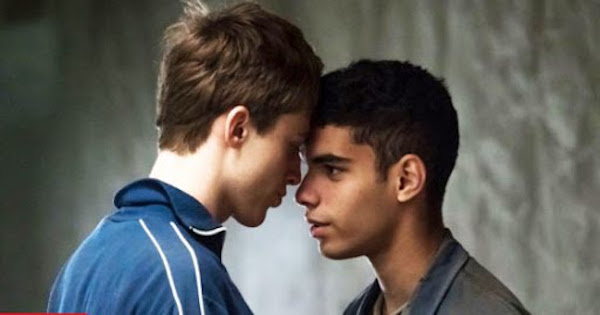Film Review: “Proud” — What It Means to Exist as a Gay Person in France
By Megan Sergison
Proud excels when it makes the political personal, utilizing its characters as affecting markers for changing minds and hearts.
Proud, directed by Philippe Faucon. Opens in virtual cinema on June 19. In French with English subtitles via select cities through Kino Marquee.

A scene from Philippe Faucon’s three-part epic Proud, an exploration of the evolution of LGBTQ rights in France.
To be gay in the 21st century is a far different fate than it was just one generation before.
Few social movements have progressed as rapidly as that for equal rights for the LGBT community. We know this: its greatest successes play out in the public eye, take over city streets each June, make the evening news, and set our phones alight with notifications with each step forward. Proud (Fiertés) knows this too. A three-part miniseries directed by César-winning filmmaker Philippe Faucon, and available today in select virtual cinemas, the narrative examines the evolution of the movement through the people it has touched, dramatizing the ways they have grown alongside the cause.
Set against the backsplash of a changing France, Proud takes place over a span of 30 years and follows three generations. In 1981, amidst the election of leftist president François Mitterrand, young Victor (Benjamin Voison as a teenager, and Samuel Theis as an adult) struggles with his budding sexuality: just minutes after we meet Victor, his working-class, socialist father Charles (Frédéric Pierrot), spots him in a compromising position. Charles, despite his supposed progressive beliefs, struggles with this newfound knowledge. The two of them dance around the truth they both know but cannot say. The tension created by this secret breaks when the inevitable wave of social change crests over the horizon. By the time 1999 rolls around, Victor, now older but perhaps not wiser, continues to be traumatized by the rift. Even though France allows civil unions for gay couples, he struggles to construct a meaningful conception of family. He and his partner Serge (Stanislas Nordey) jump through hoops in their efforts to adopt a child. The pain of their efforts eventually takes a toll, leaving the pair isolated – ironically at a time so many in France are joyously united. 2013, when it comes, finds the cast joined by Victor’s adopted son, Diego (Julien Lopez), whose coming of age provides a catalyst for the renewal of relationships, for the film’s characters to find forgiveness and acceptance. Gay marriage is legalized and pride blooms across France. Victor’s and Charles’s lined faces and white hair are set against fluttering rainbow flags — finally, everyone breathes a little easier.

A scene from Proud
By and large, Proud presents a fraught and at times simplistic portrait of what it means to be gay. The story often leans too heavily on common tropes of queer media: the homophobic father, the lover dying nobly of HIV/AIDS. But, despite its faults, Proud excels when it makes the political personal, utilizing its characters as affecting markers for changing minds and hearts. Charles, especially, grows remarkably over the course of the series, transforming from a disapproving father into a loving grandfather, finding strength in his ability to accept his shortcomings. But the series truly belongs to Victor, as he moves through a society that was not made for him and adapts to a world that was crafted to be inhospitable. At first, he struggles with a cognitive dissonance, triggered by the then-common belief that same-sex desire was a mental illness. He believes he can compartmentalize his attraction to men and let his life continue unaltered. This alienation from his desires continues to stunt him emotionally throughout the series. Even though society bounds forward with each installment, Victor seems to barely keep up, trying on facade after facade in a facsimile of self-acceptance. Put simply, he doesn’t know how to exist in a world where he doesn’t have to be scared.
Evolving understandings of what it means to exist as a gay person in France irrevocably shapes this family, just as a gardener would prune and shape trees. These perceptions disrupt relationships, yes, but eventually the defects of the past are left behind: imperfections are overcome. These three men live a paradox: when society shifts, their most private selves are also transformed. The election of a socialist president, the passing of civil unions and then marriage for same-sex couples – these seismic events, dictated by seemingly distant powers, change the world. Not just in terms of the expansion of civil liberties and equal rights, but in how lives are allowed to be lived, even within the span of a single generation. Proud may not live fully up to its name, but it provides a frank reminder that the past is not as far away as we would like to believe.
Megan Sergison is a writer currently based in Somerville, Massachusetts. She can be found staring out of the windows of public transportation listening to film scores, persuading anyone and everyone to watch Portrait of a Lady on Fire, or over on Twitter at @megserg.
